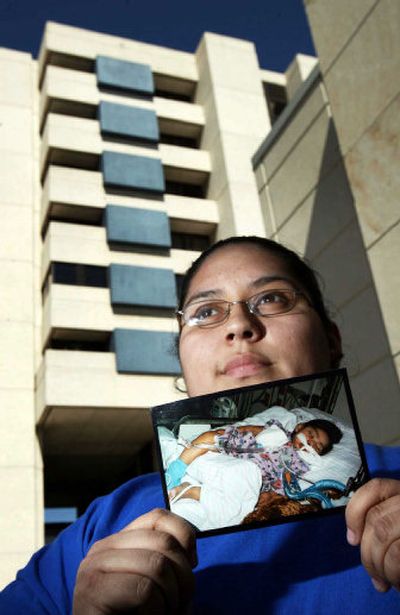Texas’ ‘futile-care’ law under national spotlight

AUSTIN, Texas – A 17-month-old deaf, blind and terminally ill child on life support is the latest focus in an emotional fight against a Texas law that allows hospitals to withdraw care when a patient’s ongoing treatment is declared “medically futile.”
Since Dec. 28, baby Emilio Gonzales has spent his days in a pediatric intensive care unit, mostly asleep from the powerful drugs he is administered, and breathing with the help of a respirator. Children’s Hospital here declared his case hopeless last month and gave his mother 10 days, as legally required, to find another facility to take the baby. That deadline, extended once already, was due to expire Wednesday, at which time the hospital was to shut off Emilio’s respirator. Without the machine, Emilio would die within minutes or hours, hospital officials have said.
But the child’s mother, Catarina Gonzales, 23, and lawyers representing a coalition of state and national disability rights advocates and groups that favor prolonging life persuaded a Travis County judge Tuesday to force the hospital to maintain Emilio’s care while the search for a facility to accept him continues. The group’s attempt last week to persuade a federal judge to intervene in the case failed.
County Probate Judge Guy Herman appointed a guardian ad litem, or attorney, to represent Emilio’s interests and issued a temporary restraining order prohibiting Children’s Hospital from removing life-sustaining care from the child. He set an April 19 hearing on the mother’s and lawyers’ request for a temporary injunction against the hospital.
“I believe there is a hospital that is going to accept my son,” said Gonzales following the brief hearing. “I just want to spend time with my son. … I want to let him die naturally without someone coming up and saying we’re going to cut off on a certain day.”
Michael Regier, senior vice president for legal affairs of the Seton Family of Hospitals, which includes Children’s Hospital, said the child’s condition continues to deteriorate although he has not met the criteria to be declared brain dead. He said the hospital has contacted 31 facilities “without any single indication of interest in taking the transfer.”
Gonzales and her lawyers are seeking a transfer for the child, diagnosed with a terminal neurometabolic disorder called Leigh’s disease, to a hospital that will perform a tracheotomy and insert a feeding tube so that he can live out his life in the facility or at home with his mother. But Children’s Hospital doctors have declared that continuing treatment is potentially painful and is prolonging the child’s suffering.
Emilio’s case has drawn interest and support nationwide, including from the siblings of Terri Schiavo, the Florida woman who was in a persistent vegetative state and who died in 2005 after doctors, acting on a court order, removed her life-sustaining feeding tube.
Texas’ six-year-old “futile-care” law is one of two in the country that allow a hospital’s ethics committee to declare the care of a terminally ill patient to be of no benefit and to discontinue care within a certain time frame. The patient’s family or guardian must be informed in advance of the ethics committee meeting and must be allowed to participate. The family must also be given 10 days to find a medical facility willing to accept their terminal relative. After that period, the hospital may withdraw life support. Virginia gives a family 14 days to transfer a patient once a futile-care decision is made.
According to a 2005 report by the National Right to Life Committee, 11 states require that a patient be given life-sustaining treatment until a transfer is completed, without prescribing a deadline. Fifteen states and the District of Columbia have laws that require treatment pending a patient’s transfer but do not define the type of treatment. Twenty-four states and territories have laws addressing the issue but are ambiguous about treatment pending a transfer.